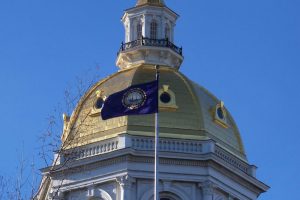
Long a proponent of allowing the free market to dictate energy sources and prices, the administration of Gov. Chris Sununu is now having second thoughts.
Citing New Hampshire’s soaring electricity prices, the administration is pushing legislation that would allow electric distribution utilities to buy power directly from generators rather than solicit new energy resources from regional wholesale markets.
They would be authorized to enter 20-year power purchase agreements to procure up to 2 million megawatt-hours annually, or about 20% of the state load.
The bill does not dictate that the utilities pursue the purchase of any particular energy source, but clean energy advocates say the proposal could help low-cost renewables compete against established generators. Other New England states have carved out procurements limited to renewable energy, like offshore wind, partly to help develop those resources by providing a guaranteed revenue stream.
This bill instead requires that any procurement be a new electrical energy source — as opposed to an existing facility — cost-effective for ratepayers, and available during “long-duration winter cold events.”
During an executive session with the Senate Energy and Natural Resources Committee last month, the deputy commissioner of the Department of Energy, Christopher Ellms, acknowledged that the administration “has historically had discomfort with power purchase agreement legislation.”
Sign up for Energy News Weekly
Get the most important energy news of the week delivered directly to your inbox.
Indeed, the administration’s 10-year energy strategy for the state, released last year, explicitly rejected state-backed power purchase agreements, saying they distort the competitive wholesale electricity market.
But given the price shock over the past year, the administration is looking “to find new sources of energy that are reliable and deliver the cost-effectiveness that we so desire,” said Daniel Phelan, who manages regional electric issues for the energy department.
The bill is actually a complete rewrite of a much shorter bill that called for the utilities to issue requests for power purchase agreements under the state’s Renewable Portfolio Standard.
“The idea was to pitch it as a way to lower energy costs,” said Sam Evans-Brown, executive director of Clean Energy NH, who helped write the bill.
But stakeholders couldn’t agree on the language and Evans-Brown had given up hope of moving it forward.
“Then out of nowhere comes this amendment,” he said. “No one was more surprised than me.”
The amended bill approved by the committee has passed the Senate. It will be heard before the House Science, Technology and Energy Committee on Monday.
Sen. David Watters, D-Dover, who sits on the Energy and Natural Resources Committee, said discussions about the bill’s language made it clear that it had to be “fuel neutral” in order to gain bipartisan support. But he said the requirement that the source be the most cost-effective puts renewables in a very competitive position.
The Business & Industry Association of New Hampshire is also advocating for the bill’s passage. The proposal “could be an innovative way to lower energy costs for Granite State ratepayers,” the association said in an emailed statement.
But the New England Power Generators Association is staunchly opposed. State-driven, long-term contracts create a guaranteed revenue stream for that power resource, said Dan Dolan, the association’s president.
“The problem is, these facilities still have to participate in the wholesale electricity market — that’s how they get dispatched by ISO-New England,” he said. “They have to guarantee they are going to get dispatched, so they offer into the energy markets at zero dollar value. It sets up a two-tiered system and undermines the economics for everybody else.”
Dolan noted that entering into power purchase agreements would be a “dramatic departure” for the state.
“Our hope is New Hampshire goes in a different direction,” he said.
The state Public Utilities Commission is investigating the current process used by utilities to procure default energy service through the wholesale markets and how it might be improved in order to provide ratepayers with greater price stability. Dolan said lawmakers should allow that process to play out.
Some 30 New Hampshire communities are striking out collectively to buy electricity on their own at more competitive rates. The Community Power Coalition announced last month that the first 10 communities launching community power programs this spring will deliver considerable savings to their residents.
The coalition’s rate of 15.8 cents per kilowatt-hour will represent a 22% savings for Eversource customers, 28% for Liberty customers, and 39% for Unitil customers, the coalition said in a press release.



